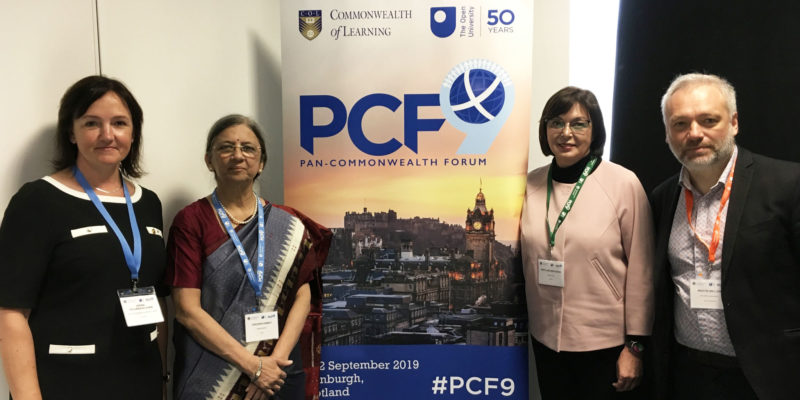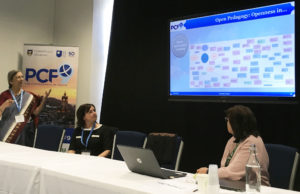UNESCO IITE at the Ninth Pan-Commonwealth Forum on Open Learning
UNESCO IITE became the partner of the Ninth Pan-Commonwealth Forum on Open Learning (PCF9) in Edinburgh, Scotland on 9-12 September 2019. Organized every three years, the Forum is considered one of the world’s leading international events on open, distance and technology-enabled learning.
This year the Forum was co-hosted by the Commonwealth of Learning and the Open University (United Kingdom) and was focused on “innovations”, “quality” and “lifelong learning” under the theme “Innovations for Quality Education and Lifelong Learning”. Over 550 policy-makers, practitioners and thought leaders from 61 countries across the Commonwealth and beyond came together to discuss, debate and showcase how innovations improve the quality of education and create new spaces for lifelong learning. The Forum covered the following key sub-themes:
- Employability
- Equity and Inclusion
- Opening Up Education
- Technology
Within the Forum’s sub-theme “Opening Up Education”, UNESCO IITE organized the panel session “Harnessing the Potential of Openness for Higher Education and Lifelong Learning”, which was moderated by Ms. Svetlana Knyazeva, Chief of the Unit of Digital Pedagogy and Learning Materials at UNESCO IITE. The panel session served as a platform to discuss the perspectives of openness of education in the digital age, the opportunities and implications of openness in post-secondary education and lifelong learning.
Open education has the potential to ensure flexibility and inclusivity of teaching and learning systems that contribute to the acquisition of the competences and skills needed for active participation in social life and adequate engagement in dynamically changing labour market. The concept of openness in higher education and lifelong learning may be considered from different perspectives, including openness of mindsets and culture of knowledge sharing, openness of content and licensing, openness of education delivery, openness of pedagogy and teaching and learning tools and practices, openness as absence of restrictions in access to education, openness in recognition of learning outcomes etc.
 In this context, Ms. Svetlana Knyazeva considered the issue how Open Educational Resources (OER) can contribute to the achievement of the Sustainable Development Goal 4 (SDG 4) with its key pillars of access, equity and inclusion. “The Qingdao Declaration also mentions potential of OER to expand access to lifelong learning opportunities, achieve quality education and establish legal and political frameworks that promote, inter alia, coordinated partnerships” – noted Ms. Knyazeva. In addition, she summarized the findings of the joint project completed by UNESCO IITE together with OER Africa.
In this context, Ms. Svetlana Knyazeva considered the issue how Open Educational Resources (OER) can contribute to the achievement of the Sustainable Development Goal 4 (SDG 4) with its key pillars of access, equity and inclusion. “The Qingdao Declaration also mentions potential of OER to expand access to lifelong learning opportunities, achieve quality education and establish legal and political frameworks that promote, inter alia, coordinated partnerships” – noted Ms. Knyazeva. In addition, she summarized the findings of the joint project completed by UNESCO IITE together with OER Africa.
 Ms. Airina Volungeviciene, Professor at Vytautas Magnus University (Lithuania), introduced the issue of accessibility of OER, Open Educational Practices (OEP) and Open studies. Teachers and students do like collaborative development of OER and OEP. Sometimes they consider opening their practices and collaboratively developed resources as a tool for promotion and best practice examples, transferring them from formal studies into informal learning and vice versa. Both OER and OEP often serve as examples of learning results or assignments that meet the quality characteristics, but are not re-used or re-purposed for different learning purposes. One of the reasons is the accessibility of OER and OEP for redevelopment due to technological solutions chosen for their development.
Ms. Airina Volungeviciene, Professor at Vytautas Magnus University (Lithuania), introduced the issue of accessibility of OER, Open Educational Practices (OEP) and Open studies. Teachers and students do like collaborative development of OER and OEP. Sometimes they consider opening their practices and collaboratively developed resources as a tool for promotion and best practice examples, transferring them from formal studies into informal learning and vice versa. Both OER and OEP often serve as examples of learning results or assignments that meet the quality characteristics, but are not re-used or re-purposed for different learning purposes. One of the reasons is the accessibility of OER and OEP for redevelopment due to technological solutions chosen for their development.
 Mr. Martin Weller, Professor at the Open University (United Kingdom), spoke about different aspects of open education, including open and distance education, Open Education Resources (OER), massive open online courses (MOOCs), open textbooks, and Open Educational Practices (OEP), and how they help to remove barriers and widen access to education reasoning, among other, from the experience of the Open University UK, which celebrates its 50th anniversary in 2019.
Mr. Martin Weller, Professor at the Open University (United Kingdom), spoke about different aspects of open education, including open and distance education, Open Education Resources (OER), massive open online courses (MOOCs), open textbooks, and Open Educational Practices (OEP), and how they help to remove barriers and widen access to education reasoning, among other, from the experience of the Open University UK, which celebrates its 50th anniversary in 2019.
Ms. Vasudha Kamat, Member of the National Education Policy Committee and former Vice Chancellor at SNDT Women’s University (India), addressed the issue of Open Pedagogy and teaching and learning practices. In her presentation, Ms. Kamat highlighted three major aspects of Open Pedagogy, including OER Enabled Pedagogy, Teaching-Learning Process and User-generated content, and mentioned the challenges related to the use of Open Pedagogy.
The presentations raised much interest and prompted questions from the participants, which triggered further discussion, during which the speakers and participants addressed such issues as the quality of open educational materials, efficiency of open educational practices, smart tools and technologies used in the process of open education delivery, appropriate digital skills required for success in open education enterprise.

